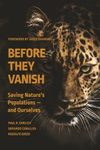![Primate Socioecology Primate Socioecology]()
Click to have a closer look
About this book
Contents
Customer reviews
Biography
Related titles
About this book
This game-changing book questions long-accepted rules of primate socioecology and redefines the field from the ground up.
In Primate Socioecology, renowned researcher Lynne A. Isbell offers a fresh perspective on primate social organizations that redefines the field from the ground up.
Through her innovative Variable Home Range Sharing model, Isbell unravels the mystery of why some primates live alone while others live in pairs or groups – a question that has perplexed scientists for decades. This new approach diverges from the traditional focus on predation pressure as the main determinant of primate social organization to reveal deeper ecological causes of primate behaviour. The implications of this shift are profound, underscoring the critical importance of a behavioural-ecological mechanism in which varying movement strategies affect which females share their home ranges and ultimately pointing to a new functional classification system for primate social organizations.
Isbell also discusses:
- a supportive test of predicted movement strategies using activity budgets
- why thermal constraints explain the dichotomy between small nocturnal primates and large diurnal primates
- the role of sensory differences in nocturnal solitary foragers versus diurnal group-living primates
Useful as both an introduction to primate socioecology and for those seeking a robust examination of the topic, Primate Socioecology addresses scientific debates about primate social organizations and invites researchers to question long-held assumptions.
Contents
Preface
1. Highlights in the History of Primate Socioecology
2. Dispersal and Philopatry
3. Introducing the Variable Home Range Sharing Model and its Classification System for Primate Social Organizations
4. Using Movement Strategies to Identify Constraints on Home Range Expansion and their Relative Importance for Different Female Social Organizations
5. Beginning to Test the Variable Home Range Sharing Model
6. Problems with Predation as a Selective Force on Primate Social Organizations
7. How Refocusing can Resolve the Nocturnal/Diurnal and Solitary Forager/Group Living Divide
8. Male Contributions to Female Social Organizations
9. Questions that May Arise
Appendix
References
Acknowledgments
Index
Customer Reviews
Biography
Lynne A. Isbell is a professor of anthropology at the University of California, Davis. She is the author of The Fruit, the Tree, and the Serpent: Why We See So Well and a coauthor of Black, Brown, and White: Stories Straight Outta Compton.
New
By: Lynne A Isbell(Author)
257 pages, 3 b/w photos, 18 b/w illustrations, tables
"Primate Socioecology is one of those rare pieces of scholarship that presses the reset button on our assumptions by waking us up to the reality of 'Variable Home Range Sharing' in primate social organization. Isbell's book is an empirical and creative tour de force that will shape discussion for decades to come."
– Nina Jablonski, Pennsylvania State University, author of Living Color: The Biological and Social Meaning of Skin Color
"A persuasive call to rethink traditional explanations for species differences in sociality. Isbell's theory is explicit, richly supported, and thoroughly constructive. I expect this frank, creative discussion to inspire primatologists for decades"
– Richard W. Wrangham, Harvard University, coeditor of Chimpanzees and Human Evolution
"A must read for anyone interested in the history and development of theoretical primate behavioral ecology."
– Thomas T. Struhsaker, Duke University, author of The Red Colobus Monkeys: Variation in Demography, Behavior, and Ecology of Endangered Species



































